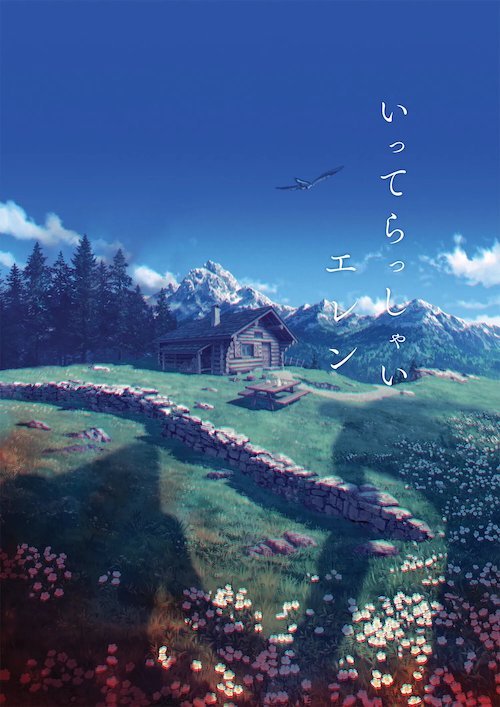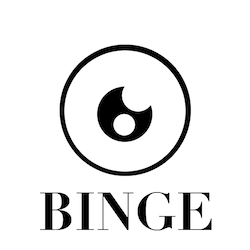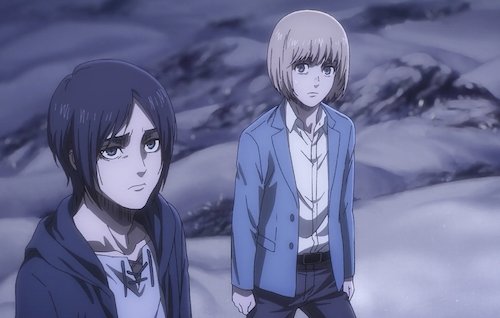Attack on Titan: The Final Chapters: Special 2: Binge, Fringe, or Singe?
Written by Andreas Babiolakis
Binge, Fringe, or Singe? is our television series that will cover the latest seasons, miniseries, and more. Binge is our recommendation to marathon the reviewed season. Fringe means it won’t be everyone’s favourite show, but is worth a try (maybe there are issues with it). Singe means to avoid the reviewed series at all costs.
Warning: The following article features spoilers for Attack on Titan, including “The Final Chapters: Special 2”. Reader discretion is advised.
And just like that — after ten years of programming, no less — the anime based on Hajime Isayama’s Attack on Titan is finished. With a prolonged fourth season that went from taking years to wrap up to concluding in just a ninety-minute special, we finally got closure on the beloved series that had people biting their nails for an entire decade: initially from anxiety and tension, then from stress as to whether or not the show would stick its never-ending landing. Well, it did. Despite the polarization of the manga source material and Attack on Titan’s faithfulness to these materials, the show is all the better for how it ends, perhaps not with a show-stopping bang but with a finale that resolves the show nicely and powerfully. It may not be a finale for the ages, but it is rightfully the final episode of Attack on Titan through and through, and we can now rest assured that this masterful animated series never lost its impact or way.
First, there’s the final battle: a climax where Eren Yeager is about to follow through with his plans to wipe out eighty percent of humanity, to cut back on overpopulation and the increasing susceptibility of a war-based apocalypse. Throughout most of the fourth season, it was clear that Eren turned to the dark side and seemingly lost sight of his original intentions (to save everyone). Eren is backed by Colossal Titans and ready to take down most of civilization; this is when the Nine Titans are sent in by Ymir Fritz to double down on this quest. In the very special that promises to deliver the showdown of the series — with the Scouts and Warriors at the ready — we find the most sympathy of the entire show, and it is this element that I love the most about this final episode of Attack on Titan; for a show that devoted so much time towards showcasing the hideousness of humans, it reserved its glimpses of faith in humanity exactly when it needed it the most. We needed to be reminded of why exactly Eren’s plans are monstrous (outside of the obvious genocidal nature of it all, of course): humans are capable of awful actions, but they’re capable of brilliance as well.
Part of that latter sentiment can be felt throughout Attack on Titan as an entire series, with the painstaking art put into each and every frame, the complexities of the narrative, and the scope of the themes of destruction and societal implosion that are presented better here than most stories of any medium thus far. Did Attack on Titan take forever to finish? Yes, but I would rather a great project be delivered when it is ready rather than a shoddy result get rushed due to pressure and demand. If you want any indication that humans exude beauty and worth, this very show and how it was painstakingly worked on is proof enough of what we are capable of. The best of humanity is worth fighting for; the best of what Attack on Titan can depict about us fascinating, peculiar creatures was worth waiting for.
The final episode of Attack on Titan is relieving with its signs of why humanity is worth protecting.
“The Final Chapters: Special 2” pulls out all the stops to make humanity worth saving, from clear sequences of tender moments between characters (what feels like a rarity for this series) to clear references and symbols; my personal favourite is the use of the baby-amidst-chaos allegory from Battleship Potemkin and the red garment on top of a greyscale backdrop from Schindler’s List to insist that the safety of this infant is of the utmost importance: the way forward is with the next promising generation. There is also much tranquillity in this finale as well, and, oddly enough, we get this from Eren and his “final” conversations with his former allies. The main one we focus on is with Armin Arlert who was once his best friend and now his adversary of sorts. Eren confesses that everything he did was to protect his friends, even if they were the only people he could save. He refused to let anyone stand in his way despite his misguided attempts, leading to the bombshell revelation that Eren is responsible for his own mother’s death, having sent the titan back to that unfortunate day that started this quest of young Eren’s to stop all titans once and for all. Look how well that turned out. In the same way young Eren had no say in his fate, it’s clear that adult Eren may be wiser and in more control but is also falling into the same trap of his own. Despite how all-knowing and all-powerful Eren has been, it’s clear that he is his own worst enemy and the biggest threat in Attack on Titan: he is only human.
Amidst scenes of play, meditation, love, and forgiveness, we see Mikasa Ackerman tearfully know what she has to do when she has the opportunity: put Eren out of his misery once and for all. As he hangs his weary head and looks up with a complete understanding of his fate, Mikasa beheads her childhood friend whose eyes gaze at her as if she is the most beautiful person he has ever seen; seconds before death, Eren is reminded of the best of humanity. The titans dissipate for good. The main enemies of Attack on Titan, as we were initially led to believe in Season 1, are gone. Of course, the military, politicians, rebels, et cetera remain, and so the threats of slaughter continue. Eren was right: people will continue to kill one another. We will be our own demise. The world will continue without us. There was nothing Eren could do, and he only became his worst demon in his futile efforts. Eren is cemented as one of television’s great antiheroes particularly because he had such promise in the early episodes, and yet we also, unfortunately, understand how he got to such a tyrannical place through grief, corruption, defence, and retaliation.
Years after Eren’s death — with his head buried under the tree he used to nap underneath to represent eternal rest — his friends (Armin, Mikasa, and all) try to uphold his quest to make them in charge of saving humanity; they are recognized for the day Eren fell and the titans vanished, but they continue to try to be the saviours of society. These efforts would only go so far as Paradis is bombed to smithereens and Earth heals by allowing nature to grow over its ruins. In the same way that Attack on Titan is stuffed with full circle moments, occurs another as a mysterious boy spots the tree where Eren’s head is buried, which closely resembles the tree containing the power of the titans (in a sense, it still does). History will repeat itself. We are the destructors of nature and ourselves. At least we got to see moments of humility and peace in this finale because Attack on Titan would otherwise be so engulfed in misery. Its point about our monstrosities still stands true, if it doesn’t feel stronger because of the wholesome images in between the slaughter.
This is a hell of a way to send this series off. We ourselves cannot do much in our lives to better the state of things. What we can do is remember who we love, why we love them, and what makes us happy to be alive. Even a show as cynical and horrific as Attack on Titan recognizes that this is what will keep us going; ironically, it saves it for last as a means of resolution as opposed to propulsion. What will happen (even though it would have already) is the longevity of Attack on Titan’s legacy; it was already destined for greatness, but now it is with certainty that Attack on Titan is a near-flawless masterpiece of anime. This cherry-on. top of optimism and faith is the surprise those of us who didn’t read the manga didn’t know we needed. We’re all aware of how awful we can be as a species; nowadays, it helps to be reminded of how we can be incredible beings as well.
Andreas Babiolakis has a Masters degree in Film and Photography Preservation and Collections Management from Toronto Metropolitan University, as well as a Bachelors degree in Cinema Studies from York University. His favourite times of year are the Criterion Collection flash sales and the annual Toronto International Film Festival.





